After three weeks of sailing, we motored around the north point of Barbados, out of our familiar and friendly trade winds and into the lee side of the island.
I know…what?! Wasn’t I just in Ireland? Blog-ically speaking, yes, and I will fill in the gaps, eventually. I know it’s not quite fair to spoil the ending, but Ireland and Europe was a lot of heavy growth that I’m not in a place to process and honor right now. As much as I pushed myself to do some writing, I finally surrendered (perhaps a bit too late) to the reality that sailing across the Atlantic with five lively crew is more a time for play than deep reflection. And wouldn’t you rather read about a lovely Caribbean island right now in your northern hemisphere winter?
So, we approached Barbados. Pushed in by thick rain storms, which danced around and teased us, hitting and cleaning our boat, hiding and revealing the only land we’d seen in twenty-one days. I was all excitement from the moment I woke, a frenzied state of singing and hopping around, maybe the only one delighted by the squalls.
I focused on the clouds at their edges, like I did as a little girl, watching for pointy, funnel-shaped growths. I remembered the squall I saw with my father and brother, where a waterspout grew down from the clouds and then up from the sea and connected, a skinny little sucking tube. It was incredible. Dad reasoned that it might be heading our way, since it was straight up and down, and a waterspout being blown to the side should have a bend. So we tacked.
It eventually imploded and disappeared. The windy wall of the squall hit fierce, leaning the boat over for a minute, and then died into a downpour so heavy that we were soaked in seconds, with no bimini covering the cockpit. We bathed our bodies and washed all of our clothes in the buckets that were filling in seconds, water rushing through hose led from the cabin-top gutters.
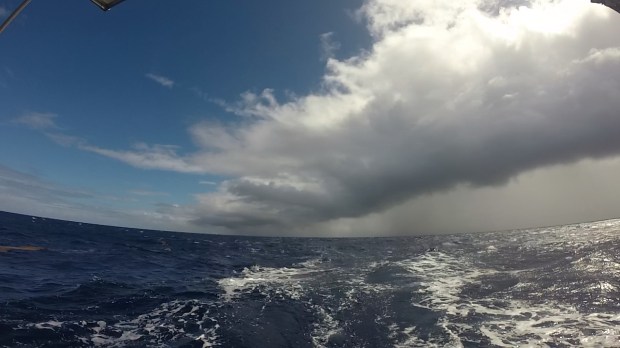
During this Atlantic crossing, the others grumbled about the elusive sun, feeling cheated on their Caribbean experience. For me, the rain meant relief from heavy heat exhaustion. It meant free water and clean clothes. It was a feature I had always loved about the tropics. I was coming home.
The island grew taller throughout the day, yet still a rather low, the highest “mountain” only 1102 feet. The northwest coast was green, desolate, seemingly very lush. Surf broke on rocky cliffs, gannets flew by to investigate our sails and the flying fish that we disturbed as we plowed through the water. And suddenly we were hit by the smell of land.
It is one of my favorite pleasures of a long passage. You cannot take a picture of a smell. You don’t even realize you’re missing it until all of a sudden there is the warm musk of trees and dirt, exploding where there has only been salt and sea. Your nose very quickly recovers, almost like it was embarrassed to have forgotten in the first place, and smells return too soon to their normal intensity. But at first, for those brief moments, it is intoxicating.
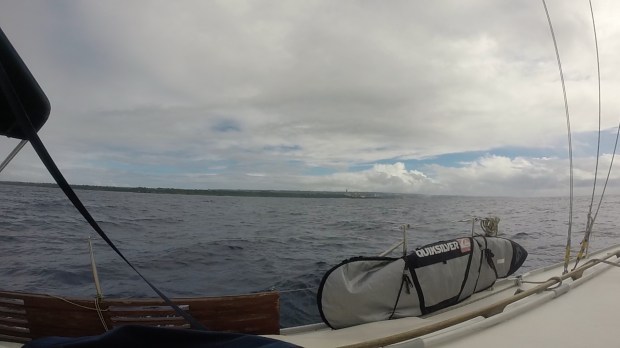 I sucked it in like cold spring water in a desert. It smelled of decomposition, the musty forests and mangroves of a very fertile tropical heat. I’d see later that it was heaps of seaweed piling up on shore, the same seaweed that had been fouling our fishing lures for weeks. My crew joked and whined that it smelled a little funky, kinda farty. I was delighted. The musk rushed into my nose, set my olfactory nerves jumping, bumping off the walls of neighboring memory storage, and shook awake years of living in the Caribbean and Central America. Once again, home.
I sucked it in like cold spring water in a desert. It smelled of decomposition, the musty forests and mangroves of a very fertile tropical heat. I’d see later that it was heaps of seaweed piling up on shore, the same seaweed that had been fouling our fishing lures for weeks. My crew joked and whined that it smelled a little funky, kinda farty. I was delighted. The musk rushed into my nose, set my olfactory nerves jumping, bumping off the walls of neighboring memory storage, and shook awake years of living in the Caribbean and Central America. Once again, home.
***************
Customs, anchor, and finally, run to the back of the boat and leap out horizontal, flopping down, breaking through the surface of the water, as the warm, clear, calm ocean folds back over me. We laugh, we hug, we jump off the boat, and then we swim to shore, to the gentle beach lined with humble hotels. I point out the Manchinelle tree with the sign warning of it’s toxicity. “Do not stand under this tree in the rain.”
My crew stare in wonder and I play the know-it-all local, like a child showing off her toys. “Yeah,” I say, “we used to find dead lizards under those trees after the rain.” Arak asks about other poisonous hazards and I delight in informing him. “Hmmm, sea urchins, wasps, thorns, that centipede that pees in your eyes and makes you blind.” (I can’t remember the name or if it’s just a childhood legend). I ramble on about everything I know, mongooses, tamarinds, and my crew gradually wanders away from my proud narrative, on to enjoy their own first impressions.
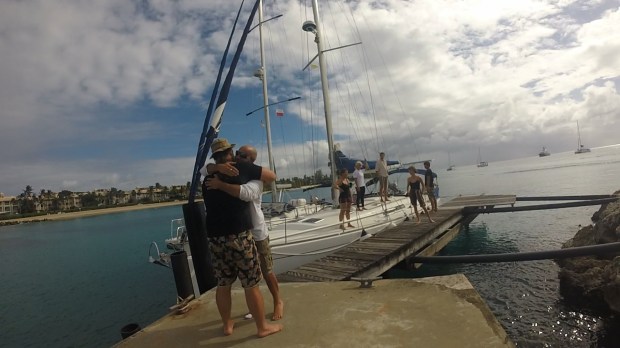
I swim the 200 meters back out the boat at dusk. The sun has relaxed, the water is glassy, all is silent. Peace hits me suddenly like a gasp of air. For the first time in many months I feel totally free. I am warm, I am moving my body, I am silent, alone, safe, happy. Another rain clouds starts to dribble, cold drops on my face, warm ocean from the neck down. I remember what it is like to commune with nature, how it fills those spaces that you will try forever to fill with external attention and validation, draining yourself as you move further from the actual source.
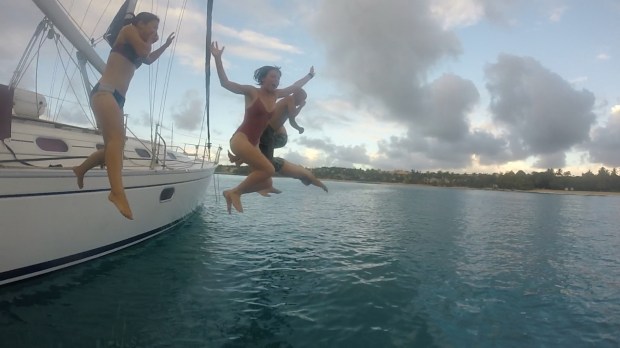
*********
Barbados is only 20 miles long. So far the biggest building we’ve seen is the cement works factory on the northeast edge, spitting rancid fumes and dominating its square of cliff edge. But from what we’ve seen the rest of the island seems modest, plenty of room to stretch out your gaze without bumping into monstrous human development.
We walk a kilometer south towards town, along a modest road where cars and mini-busses zip by on the left, tooting their friendly horn trills, hello’s and watch out’s. I am nearly skipping, delighted to see trees and plants that I know, coconut, tamarind, and intrigued by all those I don’t. A white bean in a dried pod, I wonder if it’s edible. Excited to start my Caribbean schooling.
Buildings sprout up, older wooden Caribbean style cabins, bright yellows, blues, magenta’s, mixed with more recent cinderblock and cement cubes. We come to the Speichtown bus terminal, with small food carts along the road, selling doughnuts and farm veggies. I eye the selection, intrigued by what is grown here. Root veggies, tomatoes, okra, cabbage, bananas, plantains. What I would expect.

A small square is shaded with mature trees, tamarind and one that I feel like I almost know, mahagony maybe, I’ll have to learn. Men linger around, working the stalls or just passing time, and chickens scamper around at our feet. We turn towards the water and find the short strip of modest shops and restaurants, a fading town, with its trickle of tourists. A three-story colonial looking wooden building is for sale, “The Old Pharmacy”, painted bright blue, with wooden columns bracing the upstairs balcony and big dormer windows in the slanting brown roof. “Development opportunity,” states the sign, “18 room boutique hotel approved.” I daydream for only a few minutes about opening a hostel and then notice the crumbling, rotten beams. Nope, not my destiny. I’m getting better at dismissing fantasies.
******
The first thing I need to do is change my 30 Euros into $72 Barbados. I stand in line in the air-conditioned bank. There are two tellers and four people ahead of me. An older man enters, scrutinizes the line like he’s thinking of how he can get around it, then walks up to wait behind me. The second teller finishes with a customer, looks down for a few minutes, shuffling and stamping papers, then gets up and walks out of the room. The man behind me scoffs.
“For real?” he says, and the West Indian woman ahead looks back to commiserate. I look back as well. He has grey hair, a skinny neck that curves into a hunched back, and a mouth that has a permanent plastic grin, which is not really a smile because smiles usually mean pleasure, and his remains even though he has started to complain. One of those sarcastic smiles which really bugs me (I say with a frown).
“That’s how it is here,” he continues, with an accent I can’t quite place. “Customers here are a bother.” I just soften my gaze and hum slightly in empathy, if not agreement. I am on a new-place high. I know these things take a while, it is the Caribbean. If you’ve got business to do, you’d better plan some time. Kinda contradicts the “productivity” scheme of the western world, but isn’t that what people come here to escape anyways. I thought back to registering my car in Puerto Rico, a feat that took three trips to the DMV (one day it was irregularly closed, the next I didn’t have the papers I needed) and hours in line.
Waiting is one of the acquired skills of island living, and all the more fulfilling if done with grace. Sometimes you even make some new friends. My mother met one of her best friends on St. John after Hurricane Hugo, waiting in line for the only working payphone on the island. They started talking and kept on for hours, letting others skip ahead to the phone. I grew up with her children like siblings.
The grinning man takes in my silent judgement, looks me up and down, and continues, his dimples stuck, his yellow teeth showing. “But if you’re a tourist, you can always think, it’ll be better when I go home, but if you live here like the rest of us, you just have to deal with it.” I considered his whiteness, his odd accent and wondered, could he be a local? I bit my tongue, but his negativity was cramping my high. I waited a while and we chatted a little more, before I found the right way to phrase a counter argument, so that it wouldn’t sound like an argument at all.
“Have you lived here your whole life?” was my weighted question.
“Thirty years, eight months out of the year.”
‘Aha!’ I thought, ‘you’re not a local either!’
“I’m from Denmark. There the customer isn’t treated like an inconvenience.” I mentioned I had been in Denmark in September. “It’s winter there now,” he grumbled through his confusing expression and soft voice. “Winter there is terrible, no snow even, just grey and cold.”
“So that’s why you like to come live here,” I slipped in, slyly alluding to his choice in the matter. He nodded, oblivious to the irony. He’s commiserating with the locals, adding his squirt of negativity to the culture, but meanwhile he travels back, he can leave. I felt irritated. He is right of course, customer service is different here, but it’s about equal respect, you greet them, you ooze kindness, you show them you are worthy of their respect, and it comes back. I know it will get annoying at times, when I’m in a rush especially, or feeling cranky, but I refuse to submit to his perspective now, because it’s not worth it. When I get to the point where I’m grumpy with everything, then it’s time to reevaluate my lifestyle. It’s a choice.
OK, end of rant. I exchange my money with the kind, professional teller and leave the bank.

I walk through the streets greeting passerby’s and fruit vendors, excited to recognize all the food, to see plantains and chayote. I say “good afternoon”, because I’ve read how important respect is here (as it is everywhere, really). I ignore some calls from men, which make me anxious, and feel a little rude. I am delighted to be mostly disregarded, that few people are rushing to sell me things. I have a choice in how much I want to interact.
Our crew piles into the Fisherman’s Pub, a beachfront open air bar with lowered counter-style window shutters, drowsy eyelids against the Caribbean heat. We pass an old man sitting in a plastic chair out front, watching the world rush by, and a buffet of food behind a window with names and prices written on the glass. Plantains, chicken, curried lamb, rice, fried fish cakes. Inside is a wall with a collage of fading pictures, a timeline of smiling visitors to the Pub. They are older prints developed from film cameras, before phones and selfies and digital sharing. Foggy and wrinkled, like all our remnants of childhood in the Caribbean. These simple relics add to my nostalgia, like seeing something real, substantial. A comfort that all that life used to be has not been lost.

At the counter, we order lemonade out of a big glass jar from one of the two women working. “No straw please,” I say, and the matron doesn’t understand at first. Then she smiles amused at my request. She is a sturdy, large woman, sixty-something perhaps, a strong, fun grandma type. She wears a gauze hairnet and a light blue dress, and beads of sweat shine on her dark forehead. I mention something about there being too much trash on the island, realizing too late that it sounded more like a criticism than a compassionate concern. But she stays jovial, playful, genuine.
The lemonade is a brownish color and taste more like brown sugar than lemons, sweet and iced. It feels perfect for this first hot day around town. I am relieved it comes in a glass rather than the typical plastic trash of beach bars. Chris (one of the owners of the boat) orders chicken and lamb and rice, a local bottled beer. “You want vegetables?” the matron tests. Chris says no and she clucks her teeth, raises an eyebrow, purses her lips and slightly shakes her head, the classic West Indian gesture of “you should know better.” She rings him up. $32 Barbados, $16 US. This is not a cheap island.
I decide upon seeing his food that I want some of my own. Two fish cakes, fried plantains (the sweet yellow stage, not the starchy green ones). “And vegetables!” I kiss up to cook. Something about her motherly sass has me craving her approval, acceptance into her world. She rings me up. $13. I count out the food. Plantains $5, fishcakes $2, leaving vegetables at $6? That can’t be right, but then again I hadn’t actually seen the price.
“I’ll give you $10,” I say, trying out my luck. This time both her eyebrows shoot up.
“You bargainin’ wit me?!” she demands, surprised and amused.
“Yeah,” I say, cowering and smiling shyly. “You let me?” She laughs and says something around the corner to the other woman. Shaking her head towards the register, she takes my $20 and hands me $10 back. The other woman calls something back and my matron turns to me.
“What’s your birth month?”
“August,” I say. She hoots and calls back to her coworker.
“August! Just like my sister,” she mumbles.
“And yours?” I ask.
“March, I’m an Aries.”
“Just like my mother,” I grin. I thank her, offer an awkward fist bump, and shuffle to my table, where the rest of my crew sits sucked into their first internet in three weeks. I eat in our mind-numbed silence and smirk about my interaction with the Fisherman Pub matriarch. I never returned, nervous to face her again.
*******
I met T-man the next day while sitting at another beach bar. My crew were devouring gourmet hamburgers and I was stealing their french fries and staring at the sea. The narrow beach ran up from the water to the base of a short wall, on top of which sat the street level cafe, open on all sides. A small boy, six or seven, jumped around on the sand below, bare feet and skinny legs, dark blue shorts, light blue button up shirt. His school uniform. He buzzed up to a couple on lounge chairs and did some cartwheels, covertly seeking attention.
“Isn’t your father looking for you?” asked the man, more interested in his food and lovely companion. The boy scampered back to his own play and met my eyes. I smiled at him. He bounced his way closer and continued his games on the wall. He hoisted himself onto straight arms and hand-walked back and forth on the ledge, glancing my way. I smiled again, encouraging him.
“I walkin’ on my hands!” he stated.
“I see that!” I laughed. “A little monkey.” And he bounced back down on the sand and thumped his chest like a gorilla, giggling.
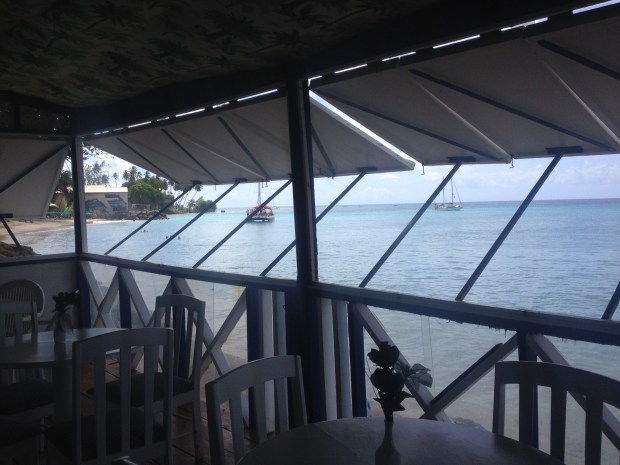
Away and back, this time he hopped up on the wall into the sandy dining room, flexing his scrawny muscles, leaping down to the beach, full of uncontainable energy. He pounded his chest, flung open his school shirt and ran circles holding it open like a cape. “I Superman!” he was saying when suddenly, mid-stride, he glanced up to the bar and stopped. The chef stood outside the kitchen door, a tall, thick man with a backwards hat and a white kitchen robe. He called out to the boy.
“Your Mamma waitin’ for you,” his voice was soft but formidable, his eyebrows stern and lowered. The boy rushed over to his shoes, fumbling with the buttons on his shirt. He glanced back at the chef, who stood watching him, arms crossed on his round belly.
“I heard you!” he whispered, respect and fear in his timid voice. I remember hearing about physical discipline in Caribbean cultures. I felt sad for the boy and amazed at the same time, watching his transformation from a pure ball of energy to intense focus as he pulled on his socks and worked at his shoe strings. Once he’d gotten control of the laces, he glanced back my way and we smirked. He trotted up to the chef, who placed a gentle hand on the back of head and walked him to the restaurant gate. As they waited, the chef leaned down as if to reprimand, gesturing slightly back at the dining room. I hoped I hadn’t caused trouble by inviting the boy to interact.
**********
The next day I found myself sitting again in the beach bar, as some of my crew drank beer and used internet. A couple of men set up speakers and laptops right next to our table, and then a steel drum. The drummer flicked his mallet and the silver basin exploded with crystal Caribbean music. I’d forgotten about steel drums. Parades in St. John, groups of school children on flatbed trucks playing together, a choir of rootsy metallic angel bells. The man played trilling melodies along with a digital back-up band, hardly glancing at the drum. I remembered that I’d always wanted to learn how to play. Yet another ambition.
At the table next to me, a plump-rumped woman in a black Brazilian cut swimsuit and precisely pressed black hair stretched a swim cap on her daughter’s head, perhaps to protect her own meticulous plaits. The girl, thirteen or so, wore a light purple bikini out of which grew her long, lean limbs. She grabbed her goggles, jumped from the cafe, and strode confidently to the water’s edge.
I watched her run over the sand, and noticed my little friend from the day before. He wore a deep red polo shirt and long blue jeans. No school uniform on Saturday. His pant legs were rolled up a couple of inches, and it was obvious he was being careful not to get too wet. But still he tempted the water’s edge, throwing stones and glass into the water, collecting sand in a plastic cup and flinging it to sea with all his force, entertaining himself. His bare feet and pant cuffs were damp and sandy.
He saw the older girl swimming and moved a little closer to her. He’d wait for her head to turn his way and then dive into floppy handstands. She looked away, not noticing. He started running up and down the beach, racing himself, marking a line in the sand, crouching to start, leaping forward into his imaginary olympics.
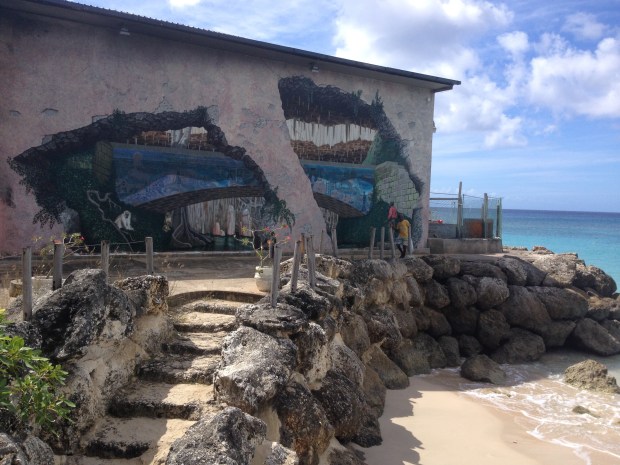
The sun dipped low, time for me to swim home. I hopped down to the sand and walked to the dinghy, beached in front of the bar. T-man noticed me and smiled wide.
“Monkey!” I said, tossing my shoes into the boat.
“You takin’ this boat?!” he asked.
“No, I’m just putting some things in it. I’m going to swim out to that boat,” I pointed. His eyes widened, impressed. But it was he who deserved the awe. “I saw you running,” I said, “you’re really fast.”
So we started racing, of course. Up and down the beach, from the beached dinghies to where ever we decided to stop, usually a hundred feet or so. I held back, but only a little. For being half my size, he was quick. We raced backwards, sideways, giggling, holding onto the others’ shirt. One would start first and the other would scold for cheating. During one race he got a head start and beat me, but then said, “You won because I cheated.” I was impressed by his maturity.
Eventually the older girl noticed our fun and smiled at us. T-man had started a new game. He grabbed the water jug I was using as a swim bag and ran away with it. Keep away. I caught up to him and he threw it down the beach, and we raced to it. I scooped it up and out of his reach. The sun was creeping down.
“OK, I have to go now.” I stuffed my skirt in the jug and tightened the lid. “I need you to throw this as hard as you can out into the water,” I said, handing it back to him. He grinned and took it from me. “Ready…go!” I ran and he sent the jug flying as I dove into the water. I slung it around my shoulder, waved goodbye and started swimming.
Halfway out I stopped and looked back. The older girl had come out of the water and the two children were practicing hand-stands together on the beach. I smiled and kept swimming.

Great read Michelle, felt like I was there. Could almost feel the sun and smell the salt and plantains as I read in my Oregon office. I’ve always wanted to learn the steel drums too. Figured the Outer Banks could use a steel drummer for wedding ceremonies; would be a great side hustle. Keep the blogging and adventuring coming, miss ya!
LikeLike
Hey Woo! Ok, we’ll start a steel drum band then, and get your little boys going also. Miss you guys too, I keep imagining you hanging out with my brother and his family:) But you’re all busy I know. Someday:) Much Love.
LikeLike
Awesome post Michelle. Barbados sounds beautiful and you description of the culture brings back lots of memories. Love you so much and talk soon!
LikeLike
Just got around to reading this – so glad the crossing went well. I love your accounts of thoughtful interactions with strangers – bargaining with the vendor, racing a boy on the beach, always with a thoughtful eye to what’s happening beneath the surface. You make me see the world with fresh eyes.
LikeLike
🙂
LikeLike